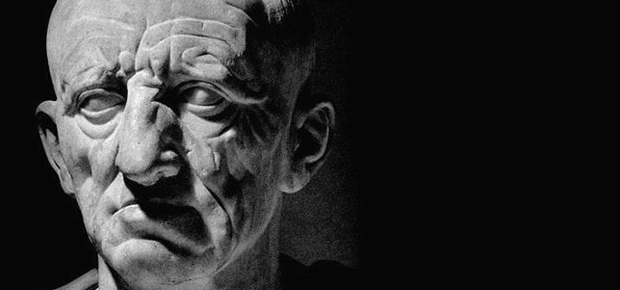
2.2.1 The first great authors
In a beautiful but underrated movies 1971 with Marcello Mastroianni and Vittorio Gassman, Scipio Africanus also called, Cato (played by Gassman) holds a wonderful monologue in which admonishes the Romans because they do not high-minded: all that is beautiful have, Art, architecture and literature, resulting from the wars against the Etruscans and Greeks. It is not fake: The Romans imported all, often after violent clashes against civilization close to them. From the Etruscans, who had settled north of Rome, drew the alphabet (uniting him to the greek), the art of divination, jewelery and various other costumes. From the world of greek, of southern Italy which was part, drew Culture, in all its forms, from religion to writing.
There will be so strange to know that the author first attested in the Latin language was an ex-prisoner of war. Livio Andronico, born in Taranto as Andronicus, obtained the noble after his former master, Livio Salinatore, it had freed. Him know that it was brought to Rome a slave after the war against Pyrrhus (280-275 a.C.). Andronicus became famous after the Latin translation of some of the plays of the Greek language and became so rich that he could buy his freedom. A Roma, in fact, Slavery was not definitive, was a matter of drachmas. He became famous, got to be able to create the first artistic union History, the College teachers Player (College of writers and actors). The work that is most related is the 'Odusia, a Latin translation of Homer's Odyssey, adapted to replace all'esametro epic towards the Saturnian, right of the Roman religion.
The second author is notable ancient Roman Cneo Nevio (III-II SECC. a.C.), lived in Atella, in Campania, also of Greek culture. Nevio was a soldier and fought in the First Punic War, told that in a poem, then converted into epic, known as One heart, Also in this Saturnian. He is also credited with, among other, a comedy entitled Tarentilla, set in Taranto.
The one who most influenced and transformed the Latin Literature, however, it was Fifth Ennio (III-II SECC. a.C.), greek Rudiae (Today in Lecce but then under the influence of Taranto). He said he had three hearts: uno greco, Osco one and one Latin, as he spoke three languages. It was the greatest epic poet of the Latins before the advent of Virgil. He was a prolific and introduced in Rome on epic meter, the esametro, Reinventing satire, transforming it into a literary genre, and wrote what was the epic Latin for excellence, at least until the advent of Virgil: Annals, from the origins of Rome to Scipio Africanus, that he was a great friend and made him famous.
The theater was very popular in Rome. The most prolific authors were Terenzio (II sec. a.C.) and Plautus (III-II SECC. a.C.)for comedy and Pacuvio (III-II SECC. a.C.)and Action (II-I secc. a.C.) for the tragedies. Terence and Plautus were two authors different from each other: comedies were the first reflective, elegant and morality thinner; those of the second one were disproportionate use of dance, songs and vulgar language. Guess which of the two was more successful. If we wanted to compare the style of the two playwrights, two modern authors, I would say that Terence is a Woody Allen as Plautus is a Mel Brooks.
The already mentioned Marcus Porcius Catone (III-II SECC. a.C.) was not only political, but also writer. Cato stands out for its conservatism. In fact, before the advent of Marius and Sulla, Roman politics was played on the cultural factor and it was fragmented among conservatives or catoniani, who wanted a Roman culture without foreign influences, much less by the Greeks (considered lewd and rather zuzzurelloni), and filogreci or scipioniani. The family of the Scipios, in fact, believed that the Empire of Rome were to base its culture sull'alessandrinismo, that had spread throughout the Middle East. Scipio Africanus, if it had not declined towards the end of his life, Caesar could have anticipated and would have used the Greek culture as an instrument of propaganda. Making Catone, is important because its For agri culture is the first treatise in Latin prose to reach us complete, and was the basis for many other themed works, as the De re rustica Varro and Georgiche Virgil.
Last but not least in importance is certainly archaic author Gay Lucilius (II sec. a.C.), who perfected the literary satire, already created by Ennio, and made it a kind seguitissimo, with metrical rules and themes. In fact, you have to think that every literary genre of Latin Literature, epic treatises, from opera to drama, derived from existing genres in Greece and casts are often adapted to the. Satire, instead, was the only kind to be born exclusively in Rome.




